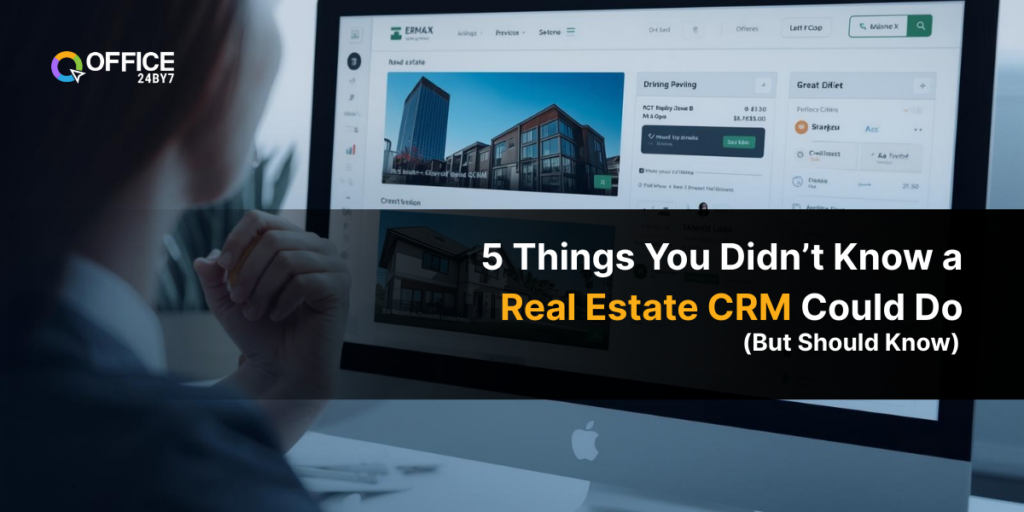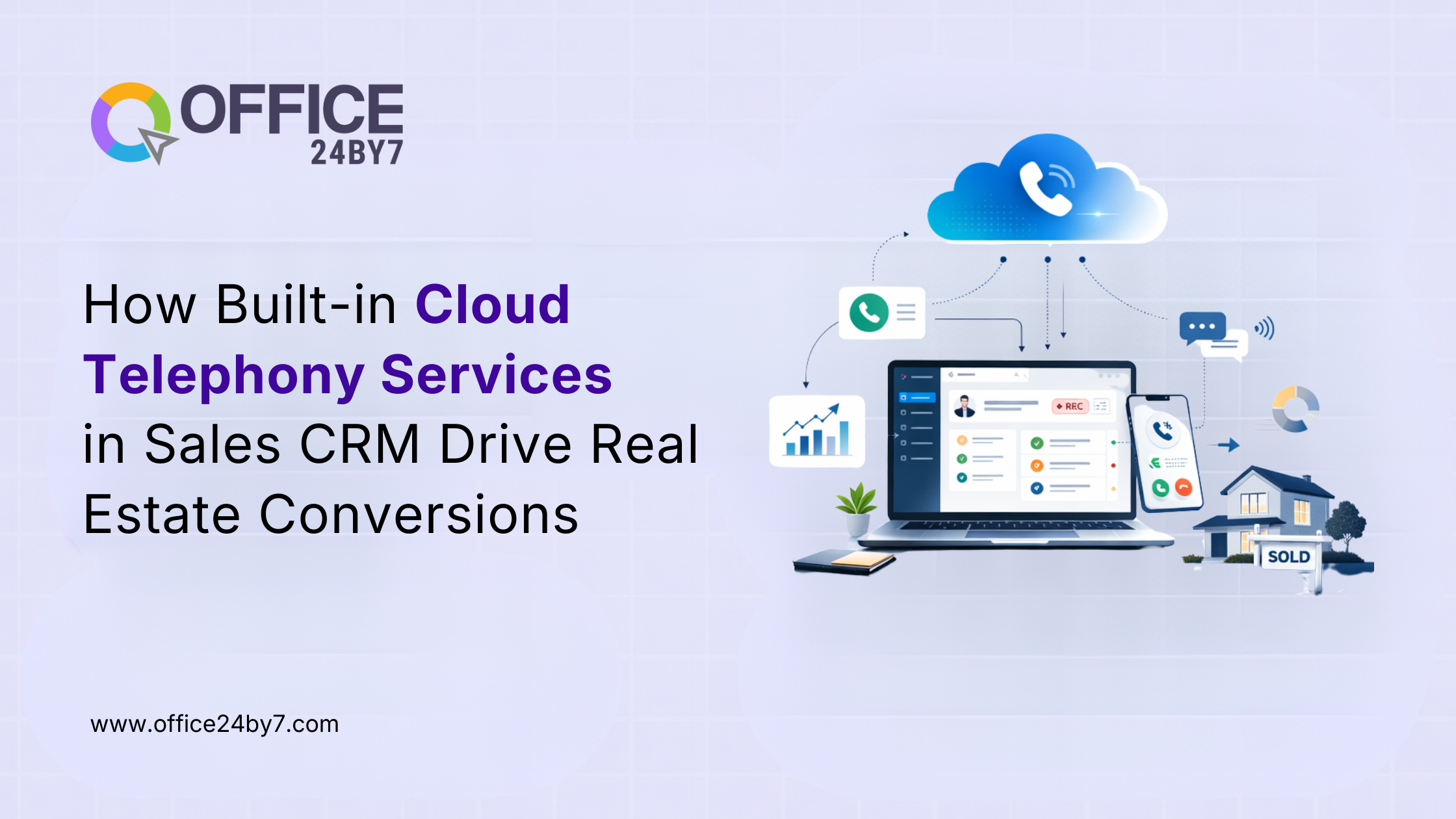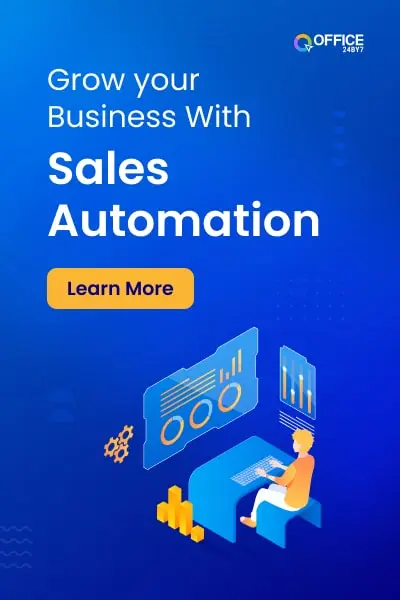
Not sure if this blog, Real Estate CRM, contains quality information?
Try our 1-minute short audio summary to decide. 🎧
Real estate management is much more complicated than name and number tracking. Business organizations today hold portfolios of properties, manage networks of brokers, comply with regulations, and serve customers whose needs evolve quickly. A real estate CRM is no longer a luxury in this environment; it will be the basis of enterprise sales transformation. What most leaders fail to acknowledge is the fact that these systems have a lot more to offer.
CRM is not a database.
These systems have evolved to become dynamic and now support data-intensive, deal-oriented, and customer-sensitive businesses.
Having added automation and various omnichannel applications and exquisite options such as cloud telephony, they have become capable development drivers with the capacity to bring visibility, close speed, and enhance ROI.
- What is Wrong with Traditional Real Estate CRMs?
- Automating Property-Centric Workflows in Real Estate CRM
- Intelligent Lead Scoring & Buyer Prioritization
- Built-In Communication Tools You Didn’t Expect
- Buyer Journey Individualization on a Large Scale
- Driving ROI With Advanced Analytics
- How Office24by7 Real Estate CRM Delivers These Capabilities
- Reconsider What a Real Estate CRM Can
What is Wrong with Traditional Real Estate CRMs?
The majority of businesses continue to use generic CRMs or tools that never reflect the real estate working processes.
Teams cannot easily integrate visits to the site, property lifecycles, and broker coordination into those templates, so they must handle the most important tasks manually. This consumes time and produces errors.
The costs of the outcomes are high. Little automation creates low deal velocity, and distributed data results in revenue leakage.
Businesses lose follow-ups, react to them late, and allow competitors to take up serious buyers. One phone call from a high-value customer may bring a one-million-dollar sale to the company, not because teams fail to close it, but because the system does not capture it and act on it. With Office24by7’s missed call service, the system records and pursues all inquiries so that no opportunity goes unnoticed.
The Hidden Price of Lost Opportunities
An outdated CRM is not only inefficient but also a costly option for the business. The leadership level feels the impact the most, as the gaps become noticeable there.
- The value prospects become stagnated due to delayed or missed follow-ups.
- Sales executives are not visible and are unable to gauge the ROI of the campaign.
- Without clarity on performance, automation, or centralized data, businesses find it almost impossible to see what works and what is lost.
Automating Property-Centric Workflows in Real Estate CRM
The real estate business operates under complicated business procedures, including property distribution and legal forms. When checked manually, these processes create bottlenecks and frustrate both employees and clients.
A real estate CRM automates all these processes and ensures that nothing remains incomplete or unnoticed. This translates to lower deal cycles, visibility, and increased productivity for CXOs.
Automated Allocation of Property in Real Estate CRM
When several individuals inherit property, the distribution can create a mess within an extremely short period of time. Using automation, the CRM attributes the correct agent or team with properties in real time, according to factors such as availability or location. It is easy and saves hours.
Real Estate CRM Task and Ticketing Management
Automation is of utmost importance here. Real estates deal with numerous departments, including sales, brokers, compliance, and legal. The lack of structure lets people postpone or even omit important steps easily.
CRM generates site visit tasks automatically, reminds people about follow-ups, and keeps all the people on track. Meanwhile, the ticketing management system registers, assigns, and follows up on all problems, including compliance checks or customer queries, until resolution.
To the decision-makers, this is a flatter organizational structure, less delay, and complete board visibility.
Intelligent Site Visit Schedule
Deals are won or lost with a site visit. A CRM will remove duplicates of bookings and will even enable a prospect to reschedule with minimal resistance by sending reminders. Customers feel they are valued, and the sales teams do not spend time on futile efforts.
Automated Lead Tracking via Real Estate CRM
All inquiries, property advertisements, referrals, or campaigns are captured in the CRM automatically. No manual data entry, no lost leads. Leaders can view the very source of leads and the sources with the most conversions.
Intelligent Lead Scoring & Buyer Prioritization
Not every inquiry is equal. An advanced real estate CRM scores leads based on technology to rank them using readiness, budget, and engagement. Sales teams do not pursue all prospects but only those that have high chances of conversion.
This ability provides the top management with something money cannot buy: Clarity. Leaders will be able to allocate resources effectively, enhance the rates of conversion, and develop the correct revenue forecasts. The contrast between generic systems and the difference is that of night and day.
Enterprises close deals at a faster rate by focusing on high-intent buyers and keeping the rest on the right path, avoiding wastage of time and effort, and making sure that all leads are handled strategically since the first interaction.
Built-In Communication Tools You Didn’t Expect
Communication is another benefit of a real estate CRM that has not been considered. Rather than using different applications to make a call or send a message, and WhatsApp, a sales CRM with combined features will centralize all. This lessens silos, and all interactions are measurable.
Click-to-Call Internally in the CRM
In click-to-call software, agents can make contact with buyers or brokers without using different platforms. They are quicker to react, and as a result, the conversion rates are high, and customers would feel that the business appreciates their time.
It also removes the possibility of dialing mistakes and gives the sales leaders visibility of performance by allowing them to call the customer and track the call itself in the CRM. This eventually enhances accountability, reduces the response time, and makes sure that no opportunity is lost due to a lack of promptness in communication.
Missed Call Tracking Revenue Saving
All the missing inquiries are recorded, automatically tracked, and pursued. Businesses are now operating virtual numbers, helping them to monitor all calls in all the campaigns, and not even one lead is left unattended. This information provides CXOs with a clear picture of response trends and how to maximize staffing, minimize lost leads, and ensure ongoing protection of revenue streams.
Buyer Journey Individualization on a Large Scale
There is no such thing as one-size-fits-all in real estate. The buyers are demanding personalization, both in the case of first-time homeowners and investors who view high-value houses. CRMs make it achievable because they can target audiences and tailor campaigns to the needs of buyers.
Real Estate Omnichannel Marketing
In the case of omnichannel marketing, businesses have one corporate voice in SMS, emails, WhatsApp, and phone calls. This uniformity will assure customers that they are dealing with a single brand, and not different departments. The campaigns can be followed through channels without leaving customers with messages that are ill-placed and annoying. This consistency, with time, fortifies the brand promise, creates trust, and retains the customers even during lengthy sales processes typical of real estate. It also translates to the CXOs to have a clear visibility in the channels that are generating the greatest ROI in marketing, making marketing more quantifiable and effective.
CRM Data Inbound Marketing
A CRM does not simply do the job of lead capture, but nurtures them. The CRM automatically records such interactions when a prospect joins property advertisements or online promotions. These connections between them and the property workflow help businesses to refine their inbound marketing approaches, flow leads easily through the funnel, and change interest into action with much less manual effort.

Related Reading
Driving ROI With Advanced Analytics
Growth is not just about following a sales pipeline.
A real estate CRM provides CXOs with a profound understanding of the deal velocity, campaign performance, and agent performance, the type of intelligence that drives better decisions in boardrooms. These analytics help leaders see the clarity of managing resources effectively, maximizing strategies, and demonstrating ROI with a sense of confidence.
Real-Time Performance Dashboards
A sales CRM unites dozens of data points, deal progress, response times, etc., and displays them in easy-to-use dashboards. CXOs can view real-time snapshots of their team performance, instead of relying on monthly reports. Such visibility allows leaders to respond swiftly to problems, be it staffing or redistribution of budgets.
Smarter ROI Campaign Measurement
One of the largest expenditures in the real estate business is marketing, and it is easy to squander money unless this expense is monitored appropriately.
CRM will be used to trace each query to the campaign that created it, be it digital advertisements, SMS broadcasting, or a campaign event. Leaders can instantly identify what is generating revenue and what is not, and have every marketing dollar count.
Smart-Up/Cross-Selling
The prediction of buyer behavior is, perhaps, one of the most valuable results of analytics.
A CRM helps discover patterns that show when a customer is ready to upgrade to a better home, a starter home to a high-end property, or when the time to make extra investments has come.
Rather than pushing the sales, the agents are encouraged at the appropriate time to make the pertinent options. This renders up/ cross-selling to be a natural rather than an aggressive way of making conversations turn into new sources of revenue.
How Office24by7 Real Estate CRM Delivers These Capabilities
The complexities in the real estate have been calculated by Office24by7, which has specifically designed its platform to address them. Unlike generic CRM, it has property-oriented workflows, automation, and in-built communication tools, which expand as the enterprise needs them.
Omnichannel Marketing: Not only SMS broadcasting, but it also has WhatsApp marketing and email marketing.
CXO analytics is a real-time velocity, campaign, and ROI solution.
Collaboration Tools: The work in the team is quick and efficient with the help of task management and a ticketing management system.
Scalability: Enterprise-level Architecture offers visibility and performance as the operation is scaled.
This is not simply about providing another adoption instrument to the decision-makers. It is everything to create a mechanism that would make sales quicker, the customer trust will be high, and the growth will be measurable.
Reconsider What a Real Estate CRM Can
The days when the book addressed books considered CRMs a fanciful thing are gone. The real estate business is too risky and too complex. Its existing platforms serve as sources of revenue, customer experience, and change.
CXOs should find the uncharted possibilities of CRMs. Office24by7 will also allow businesses to come up with property processes, tailored engagement, and calculate ROI on each stage.
Rethink your CRM. Rethink growth. Start with Office24by7.
Call us at +91-7097171717 or email sales@office24by7.com and transform your growth strategy today!





